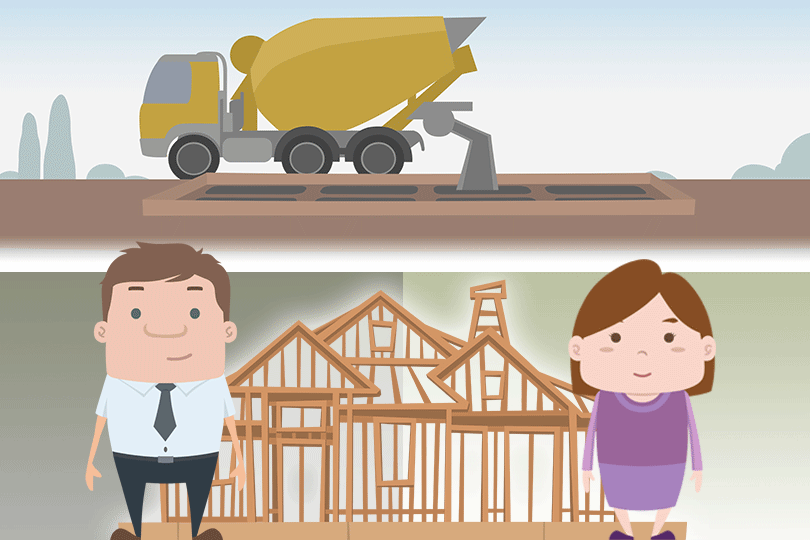How One-Time Close Construction Loans Differ

Aside from the need to own or acquire land to build on, and the need to use professional contractors to do the work, how do single-close construction loans differ from buying an existing home? We explore some important details below.
How Soon Can You Occupy the New Home?
Buying an existing home means the ability to move into the new property comparatively quickly.
Waiting out the construction process before you can enjoy your new home is an expected part of the process. What is not so expected? The idea that you may not be making mortgage payments right away because the builders haven’t finished the job yet.
Are you required to make interest-only payments during the construction phase? Are you allowed to wait to pay until the construction is over? In either case, you need to know how your loan term is affected under those terms.
Ask Your Lender About Balloon Payments
Depending on the nature of your construction loan, full mortgage payments may not become due until the construction phase ends.
Will your loan clock begin once the construction starts or does it begin at the end of the building phase? You’ll need to work this out with your lender as there are no standardized policies for all financial institutions or loan types.
The thing to know is whether you will owe a balloon payment to reach the full payoff amount of the loan within the original term of the loan.
If you don’t start making full mortgage payments until six or nine months in, your loan term won’t automatically get extended for that time period unless that’s something you worked out with the lender.
Will you face a balloon payment at the end of the loan term? If your payments are delayed due to the construction process the answer might be yes. Talk to your lender to learn how that financial institution may handle this issue.
Construction loans typically require an escrow account to use during the construction phase. That’s because single-close loan funds won’t be needed in one big lump sum.
Contractors will be paid in incremental draws rather than being given a large single payment for services or materials.
Interest Rates For Construction Loans vs. Existing Construction
Construction loan rates are typically higher than existing construction loans, which is an important difference to know about.
Well-qualified applicants may not have worries over a higher-than-typical rate due to FICO credit issues or other problems.
However, they may contend with higher rates depending on circumstances because of the nature of construction loans in general. SImply put, it’s harder to qualify for a construction loan, but it’s worth the effort if the loan is right for you.
One other important difference to remember concerns cash to close. Your down payment may be higher for construction loans than for VA or FHA purchase mortgages. Save early and plan to pay 20% down.
 FHA, VA, and USDA: One-Time Close Loans
FHA, VA, and USDA: One-Time Close Loans
Want More Information About One-Time Close Loans?
We have done extensive research on the FHA (Federal Housing Administration) and the VA (Department of Veterans Affairs) One-Time Close Construction loan programs. We have spoken directly to licensed lenders that originate these residential loan types in most states and each company has supplied us the guidelines for their products. We can connect you with mortgage loan officers who work for lenders that know the product well and have consistently provided quality service. If you are interested in being contacted by a licensed lender in your area, please send responses to the questions below. All information is treated confidentially.
FHA.com provides information and connects consumers to qualified One-Time Close lenders to raise awareness about this loan product and to help consumers receive higher quality service. We are not paid for endorsing or recommending the lenders or loan originators and do not otherwise benefit from doing so. Consumers should shop for mortgage services and compare their options before agreeing to proceed.
Please note that investor guidelines for the FHA and VA One-Time Close Construction Program only allows for single family dwellings (1 unit) – and NOT for multi-family units (no duplexes, triplexes or fourplexes). In addition, the following homes/building styles are not allowed under these programs, including but not limited to: Kit Homes, Barndominiums, Log Cabin Homes, Shipping Container Homes, Stilt Homes, Solar (only) or Wind Powered (only) Homes, Dome Homes, Bermed Earth Sheltered Homes, Tiny Homes, Accessory Dwelling Units, or A-Framed Homes.
Contact Us: Send Us Your Request – Spam Safe
Please send your email request to [email protected] which authorizes FHA.com to share your personal information with one mortgage lender licensed in your area to contact you.
1. Send your first and last name, e-mail address, and contact telephone number.
2. Tell us the city and state of the proposed property.
3. Tell us your and/or the Co-borrower’s credit profile: Excellent – (680+), Good - (640-679), Fair – (620-639) or Poor- (Below 620). 620 is the minimum qualifying credit score for this product.
4. Are you or your spouse (Co-borrower) eligible veterans? If either of you are eligible veterans, down payments as low as $0 may be available up to the maximum amount your debt-to-income ratio per VA will allow – there are no maximum loan amounts as per VA guidelines. Most lenders will go up to $1,500,000 and review higher loan amounts on a case-by-case basis. If not, the FHA down payment is 3.5% up to the maximum FHA lending limit for your county.

Do you know what's on your credit report?
Learn what your score means.






